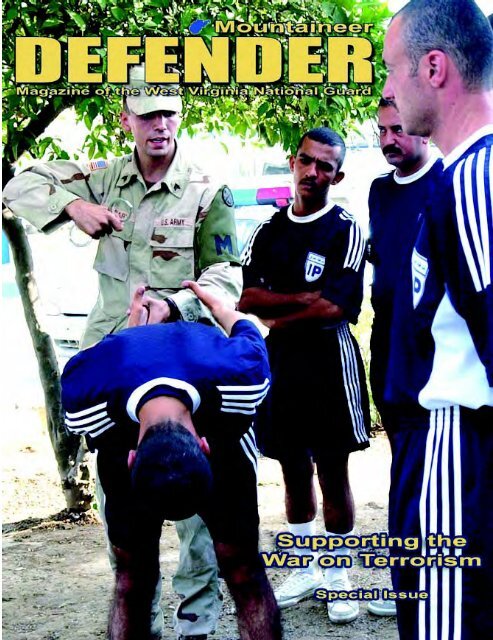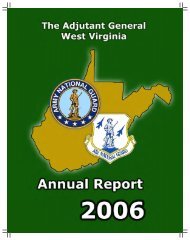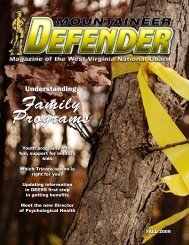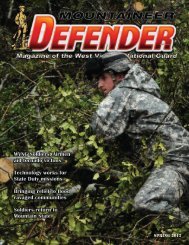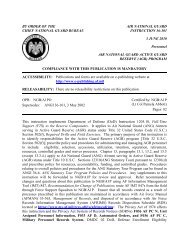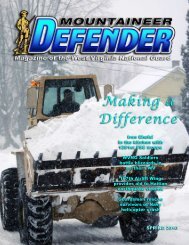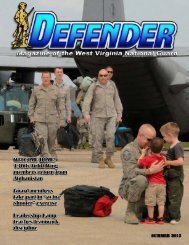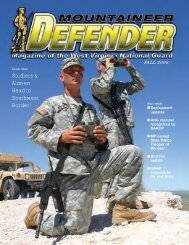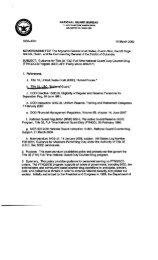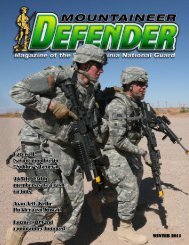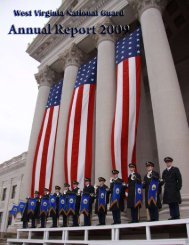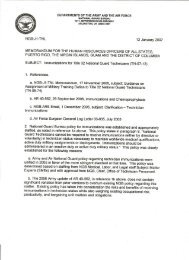Defender 03 - West Virginia Army National Guard - U.S. Army
Defender 03 - West Virginia Army National Guard - U.S. Army
Defender 03 - West Virginia Army National Guard - U.S. Army
- No tags were found...
You also want an ePaper? Increase the reach of your titles
YUMPU automatically turns print PDFs into web optimized ePapers that Google loves.
From the TAGSupporting the war on terrorism, and each otherAs we face an uncertain future, Iwant to express how proud I am of thesoldiers and airmen in the WV <strong>National</strong><strong>Guard</strong>. We are busier now thanever before, and I understand thesacrifices being made by the soldiersand airmen and their families.The WVNG responded quickly anddecisively to the President’s call toarms. Over 1,700 soldiers of the<strong>Army</strong> <strong>Guard</strong> are on duty supportingoperations in the Middle East, and500 of those just left <strong>West</strong> <strong>Virginia</strong> fortheir mobilization station. About1,000 members of our Air <strong>Guard</strong>wings have completed one period ofservice, and some have alreadyreturned to the region.This high operations tempo hasresulted in a hardship for some of thefamilies of our deployed members. Tohelp families deal with issues that mayarise, we established family assistanceCSM’s Commentscenters across the state.I encourage family members to usethese centers when problems arise thatrequire support from our militarymembers who have not deployed, andI expect each and every militarymember left behind to take care offamily issues when problems arise.Family support is vital to our successand must be done if the WVNG is toremain one of the best military organizationsin the DOD.This first edition of the “new”Mountaineer <strong>Defender</strong> focuses on theoutstanding job our units are doing insupport of the global war on terrorism.Our nation could not go to warwithout the WVNG, and our troopsare proving their worth every day.We do not know when our soldiersand airmen will be coming home. ButI promise you that until our troopsreturn, we will do everything we canMobilizations bring out best in soldiers, familiesMaj. Gen. Allen Tackettto support them and their families.Thank you for your patience andperseverance during these verydifficult and trying times.God bless you all.Command Sgt. Maj.Bruce ColemanSoldiers in the WVARNGhave seen many changes sinceSept. 11, 2001, changes thatonly a few anticipated underany conditions. Being “first asoldier” has taken a place ofhigher priority in the lives ofcitizen – soldiers across thenation. I see a more disciplined,physically fit, andprepared to fight soldier thanthose in our past. This is atime of personal commitmentto readiness, MOS qualification and NCO education.Nearly all WVARNG units/personnel have been eithermobilized, alerted for mobilization, or supported unitsbeing mobilized during the last two years. The 157th MPCO deployed twice and the 229th ENGR DET deployedonce and is alerted the second time. I have watched WVsoldiers process through eight MOB stations and in everycase they were simply the best. In many instances theywere so far ahead of their peers, that our soldiers assistedthe MOB stations in processing other units/personnel. Itwas painfully clear that with few exceptions, the US <strong>Army</strong>was not prepared to deploy as many soldiers as wasrequired. Our soldiers experienced the frustration causedby shortages in housing, transportation, training areas, andqualified personnel to conduct mobilization operations.Family separations will always be the most difficultelement the “<strong>Guard</strong> Family” deals with. There is no easyway to take control of this. The change in roles, theunknown, financial issues, sacrifices, loneliness, and otherissues cause our soldiers and their families concern. Eachsituation is unique and personal to the individuals affected.Mobilizations test soldiers, families, relationships, individualpatriotism, and the fiber of the United States ofAmerica.In closing I want to tell each of you how proud you havemade me during these trying times. I have a sincere respectand appreciation for the members of the WVARNG, theirfamilies, and their employers. Thanks to each and everyone of you for making the United States of America what itis today.Special Issue 3
156th establishes Iraqi police academyMP Detachment training new police officers to assume security dutiesStory and photos byU.S. <strong>Army</strong> Sgt. Heather Hilton16th MP Brigade Public AffairsMOSUL, Iraq - The 156th MilitaryPolice Detachment (Law and Order),<strong>West</strong> <strong>Virginia</strong> <strong>National</strong> <strong>Guard</strong>, is notonly setting the police force standardfor Iraqi Police—they’re creating it.Currently attached to the 5<strong>03</strong>rd MPBattalion, 16th MP Brigade of FortBragg, North Carolina, the 156th MPsare preparing to graduate their secondclass of Iraqi Police Academy studentsin Mosul, Iraq.Made up of 45 personnel, most ofwhom are state and federal-level lawenforcement officers in their civilianjobs, the 156th MPs have created acurriculum and environment that areleading the way for the future of theIraqi police force.Lt. Col. Younis Mahmmoud, anIraqi police officer with a master’sdegree in law, has been working handin-handwith the U.S. to create theprogram.“This is a golden opportunity forStaff Sgt. Mark Muncy illustratesself-defense techniques for hisMosul Police Academy students.4 Mountaineer <strong>Defender</strong>Staff Sgt. Greg Cook, assisted by an interpreter, demonstrates properhandcuff techniques to a group of students at the Mosul PoliceAcademy.police officers in Iraq to gain knowledge,to consult with other police,”said Mahmmoud. “Because of theexistence of the American structures,police in Iraq can now get the correctand proper training they have lackedfor many decades.”Initially taught entirely by the 156thMPs with the help of interpreters, thethree-week class is designed to teachformer Iraqi police officers, policemenand military personnel internationallyrecognizedlaw enforcement proceduresand techniques.Compiled by the 156th MPs fromboth civilian and military training, thecurriculum includes defense tactics,ethics, religious tolerance, Iraqi law,reacting to a hostage situation,responding to a domestic dispute,police duties, police reports, and, ofcourse, physical training, explainedSgt. Derek Moore, an instructor fromthe 156th MPs.Designed to eventually be takenover and taught completely by Iraqipolice who have been through thecourse, the academy grows andimproves daily, said Sgt. 1st ClassLonnie Bryson, the academy’s U.S.noncommissioned officer in charge.“When we first started we had a lotof things to overcome. There was amistrust between a lot of us (U.S. andIraqi),” said Bryson.“In just two classes we’ve come along way to build a rapport with theofficers. We’re about honesty. We’reabout integrity. We’ve built credibilityand people want to be here in thisclass.”The academy’s first class consistedof 74 former Iraqi law enforcersbetween the ages of 16 and 40, saidSgt. William Bart, another of the156th MP instructors. By the secondclass, all 120 available seats werefilled.The top four students from the firstclass were chosen to assist in teachingthe second class. Eight will be chosenfrom the second class.“We try and let them (formerstudents) teach most of the classes, sonext academy they can teach it allthemselves and we will just be there toassist,” said Moore.As the three-week academy is takenover by those Iraqi police who havecompleted the courses at the top of
their classes, the mission of the 156th MP Det. will continueto expand.“We’re moving the academy to a larger facility,” said Lt.Col. Don Lockard, the academy’s U.S. officer in charge.“We’re creating a brand-new 12-week program for thosewho don’t have any prior experience in law enforcement orsecurity.”The three-week program will still be available forintermediate students, and the 156th also offers correctionalofficer and security force training, explainedLockard, but the longer program is necessary in order togive everyone a fair chance at getting the most training.“The Iraqis that I’ve met and dealt with are smart,they’re dedicated, and we’re giving them a chance to liveup to that,” said Lockard.“It’s a great mission, being able to be here in a countrywhere there is so much turmoil. We’re getting a chanceto help give people the freedom they deserve,” saidSpc. Davida Morris, a 156th MP and main security pointobserver at the academy. “They don’t have to live infear anymore.”“We like them. Not becausethey are military, but becausethey are here to help. Everydaywe grow stronger.”- Lt. Col. Younis Mahmmoud,Iraqi police officer, referring tohis American counterpartsStanding guard on the academy rooftop in 122-degreeweather, Sgt. Jerrold Friend from the 156th MP Det.agreed with his colleague.“It’s hard being separated from family and not knowingwhen we’re going home,” he said, “But it’s a very worthwhilemission.“There was no law andorder in this country—the Iraqi people said thepolice used to be likemafia and everything wasfor money. We’re tryingAn Iraqi studentexpresses his gratitudeto American soldiersby writing “USA” on aneraser during aclassroom session atthe MosulIraqi policeacademy.Training consists of classroom instruction andhands-on demonstration. Here, an interpretertranslates a lesson to students at the Mosul Iraqipolice academy as 156th soldiers look on.to restore equality to the people of Iraq.”Trained, graduated and clad in their new light blue IraqiPolice uniforms, which distinguish them from the oldregime police force, Class 2 will hit the streets of thecommunity ready to serve.“Before, the old regime police instilled fear. Now we’reinstituting community relations,” said Bart. “(They) giveto the community instead of take away.”“Just as we have learned new information from theacademy, we suggest a program— maybe television, maybenewspaper— to give the community the knowledge of whatis happening at the academy and how the police are dealingwith the people now,” said Maj. Abd Albasit, a formerpolice officer and Class 2 student.“For example, when they are arrested, they now have theright to stay silent until they have a lawyer. It is good forthe good people…but it will be harder to teach the badpeople.”“We couldn’t ask for a better crew,” said Lockard.“And the support is nothing short of outstanding. Wecouldn’t do it without the support—from the Mosul PoliceDepartment, from the 101st (Airborne Bn.) and from the5<strong>03</strong>rd (MP Bn.).”Interpreters and former law enforcement officers areeven coming out of exile and retirement to help with themission, explained Moore.“They’ve seen what went on…they’re anxious to makethis place more of a democracy,” said Moore. “They reallywant to change. They’re ready to change.”The 156th MP Det. expects to fill all 120 seats for Class3, as well. Lockard said the program will move to a largerfacility, and the soldiers hope it will continue to grow andhelp the country in its development toward freedom anddemocracy.“We like them,” said Mahmmoud about his Americancounter parts, “Not because they are military, but becausethey are here to help. Every day we grow stronger.”Special Issue 5
‘Attica’ home to 157th MPCompanyStory by Staff Sgt. Russell Wert157th MP Co.Soldiers oversee Iraqi prisons, adapt to local cultureDIWANIYAH, Iraq - On June 10, 20<strong>03</strong>, the 157th MilitaryPolice Company assumed duty at the central jail ofDiwaniyah, Iraq. The prison, known as Attica, has amaximum occupancy of two hundred prisoners. Theirresponsibility is to provide force protection for the facilityand American personnel operating within its compound andtrain the Iraqi Police to American standards for internmentfacilities. Training objectives include proper searches ofpersonnel, vehicles, and equipment; detainment of suspects;defensive operations; and proper riot control techniques, inaddition to other minor tasks.<strong>West</strong> <strong>Virginia</strong> soldiers quickly found themselves in aunique role. In addition to battling extreme heat (temperaturesroutinely reach 140 degrees in the summer months)and infestations of sand-fleas and mosquitoes, the soldiersbecame immersed in a culture very foreign to their own.Often, the soldiers discover the armed guards they aretraining served in the Iraqi <strong>Army</strong>, which is a somewhatunsettling revelation.Complicating matters, clashes and misunderstandingssometimes occur due to the different cultures. One Iraqi6 Mountaineer <strong>Defender</strong>tradition in particular has caused problems — the firing ofweapons during a wedding celebration. This problem ismagnified during the night when soldiers have a moredifficult time assessing whether the gunfire is hostile orcelebratory. The night Saddam Hussein’s sons were killed,Iraqis celebrated with a massive onslaught of celebratoryfire. This resulted in a very tense evening for the 157th.Soldiers have also found themselves working hostilecrowds intent on seeing their imprisoned relatives. Severaltimes prisoners within Attica rioted, requiring soldiers ofthe 157th to quell the disturbances. 157th soldiers reactedprofessionally and with distinction, earning the recognitionand praise of other MP companies operating at the prison.The 157th is supervising two other prisons in addition toAttica. One is in the town of Al Hela and the other is inNajaf. All three locations are south of Baghdad in an areadominated by Shiite Muslims, opponents of SaddamHussein’s regime and victims of his atrocities. While noword of redeployment home has been received, the soldiersare executing their missions with unceasing professionalism,realizing that their role in Iraq is crucial to the successof democracy in Iraq and the broader war on terrorism.152nd commander thanks soldiers, familiesBy Capt. Bill FrankCAMP VIRGINIA, Kuwait - Flexibility and cooperationhave been the important lessons learned to date for thecompany. Since we were alerted we have had to remainflexible. We have been adjusting and changing to fit thecircumstances that have arisen. Often without logic orreason, plans and activities change. As you know, thesechanges don’t happen in a vacuum or to just one person.In a small organization such as ours, a change in oneplace always has an impact somewhere else. What hasbeen consistent with the 152nd is that no matter thechanges, the soldiers continue to perform as they should,which is a testimony to the quality soldiers we have in thisunit. Their professionalism is something that can never betaken away from the troops and, for that, I am thankful.They perform under circumstances that would cause mostto quit or feel sorry for themselves.Our soldiers have done all they have been asked by meand by their country. Their performance exceeds militarystandards and exceeds, in my opinion, that of their activeduty counterparts.Our soldiers perform not because of their chain ofcommand but because there is a job to be done. Consideringthe adversity they have endured, the separation fromtheir family, the constant changes, the heat, and otherfactors, they have had what most would call good reason tocomplain, to quit, to be dissatisfied. But, still they do whatis asked and do it well.Everyone should be proud of our soldiers. But, it is notjust them that I am proud of, because I know it is not justthe soldier who is making a sacrifice. If no one else tellsthe families, I want them to know that I recognize andappreciate the sacrifice they are making for our country.For it is not just the soldier that has had to deal with upsand downs, with changes to plans and with hardships.You, the family and loved ones of the soldiers, have beenright there enduring and sacrificing. You are the unsunghero behind every soldier.As commander of the 152nd MP Det., I thank you andappreciate what you have already done and what youstill have to do. We have a ways to go, but we will endure.We will maintain. And in the end, we will know that whenour country asked we stood up and did our duty, enduredthe hardship and the fear of the unknown, each in theirown way. So, for that you have my gratitude and mythanks.
Nothing moves unless the 1257thStory by Capt. Paula Sydenstricker active duty, to do a job, and you didmoves Det. 1, 196th PAD itthat job well. We are glad to have youThe crowd gathered as they waited home,” Tackett said.with anticipation for their lovedones to come home. The crowdgrew louder as the buses rolledaround the corner. The membersof the Huntington-based 1257thLight/Medium TransportationCompany were home.The unit returned Aug. 23 aftera five-month deployment to <strong>West</strong>Point, N.Y. Their mission was tosupport the 2/5 Infantry Battalionand the academy cadets duringsummer training.“It is a breath of fresh air to getback to families, jobs and to just behome,” said 1st Lt. Kim Greene.Several commanding officersgave quick five-minute speeches. Oneof the speakers was Adjutant GeneralAllen Tackett.“You were called upon to go toTruck drivers out from behind the wheel1863rd TC mission involves security, force protection at air basesStory and photos bySpc. Sherree Casper, Det. 1 196 PADA <strong>West</strong> <strong>Virginia</strong> <strong>Army</strong> <strong>National</strong><strong>Guard</strong> unit is making history with itsdeployment in support of OperationNoble Eagle.The 1863rd TransportationCompany based in Oak Hill is the firstunit in more than 15 years to augmentsecurity for the MountainState’s two air bases.In February, 20<strong>03</strong>, 68 soldiers fromthe 140-member transportation unitwere mobilized for the mission toaugment the Air Force’security forcesat the 130th Airlift Wing in Charlestonand the 167 th Airlift Wing inMartinsburg.“The reason why we areaugmenting is the need to sustain ahigher force protection level and theactivation of the Air Force’s securityMaj. Gen. Allen Tackett gives a big thumbsup to members of the 1257th during awelcome home ceremony Aug. 23. Capt.Todd Miller is at the podium. (Photo by Pfc.David Dyer)The unit was supposed to gooverseas, but instead provided forceprotection for our future officers.forces since 9/11,” said Capt. ThomasG. Cook II, commander of the 1863rd.As 35 members of 1st Platoonfound themselves pulling security dutyat Charleston, 33 soldiers from 2ndPlatoon were dispatched toMartinsburg to provide additionalsecurity support there.“The unit as a whole appreciatesthe opportunity to be selected andgiven the opportunity to work withboth the 130th and 167th,” Cook said.It’s the first time in the unit’shistory that it has ever been tasked toprovide base security. But troopsappear up to the challenge. Standingguard at the 130th Airlift Wing’s maingate with Senior Airman Kelly Allenby her side, Pfc. Helen Lambertchecks the identification of driversentering the base.Although a truck driver, Lambert“Sometimes you may not get themission you want, but a mission iswhat you had and we thank you for ajob well done,” said AssistantAdjutant General John Barnette.Capt. Todd Miller commandsthe 1257th. “It feels great to behome and it is great to see all thesupport here to welcome ushome,” Miller said.Frema Wilson was the familysupport coordinator while thetroops were away. Her husband,Spc. Joe Wilson, said he and theother troops were thankful for thegroup’s efforts.“Basically, my wife justtried to hold the unit togetherwhile we were away.”Lt. Col. George Mayo summedup the mission. “Whatever thechallenge you were ready, andnothing moves unless you moveit.”Pfc. Helen Lambert (l) and SeniorAirman Kelly Allen question adriver entering the main gate at theCharleston air base.likes her new role providing security.“They have been real good here,” shesaid of her blue counterparts.Allen is a member of the base’ssecurity police. “They are doing areally good job. They have the hangof things now,” Allen said of her <strong>Army</strong><strong>National</strong> <strong>Guard</strong> counterparts.Special Issue 7
LEFT: The 130thAW joined five ANG unitsand one AF Reserve unit to form the largestcollection of C-130 aircraft in the world.(U.S. Air Force photo)RIGHT: The family of Sgt. Dennis Jackson,Co. C 1092nd EN BN, decorated a vehicle inhonor of 1092nd soldiers serving in OIF.(Photo by Maj. Mike Cadle)RIGHT: Maj. Keith Fletcher, 167thAW, walks with Secretaryof Defense Donald Rumsfeld as he visitsan air base in Southwest Asia. (DOD photo)LEFT: Maj. Todd Harrell,Det. 1, 196th PAD, givescandy to Afghan children.(U.S. <strong>Army</strong> photo)AnsweringBELOW: Col. Bob Kincaid,commander of the 111th EN GP,promotes Jeff Lacy to Staff Sgt.during a ceremony at CampArifjan, Kuwait. (Photo by Maj.Ron Garton)at home anLEFT: Sandy Fealy, FRG president atCo. A, 1092nd EN BN, conducts a familyreadiness meeting at the Gassawayarmory. (Photo by Maj. Mike Cadle)8 Mountaineer <strong>Defender</strong>
RIGHT: The 119th EN Co. FRG postedpictures of their loved ones deployedfor Operation Noble Eagle. (Photo byMaj. Mike Cadle)BELOW: Brig. Gen. “Speedy” Lloyd,commander of the WVANG, penned amessage to Osama Ben Laden on aGBU-12 bomb carried by FrenchMirage 2000 aircraft supporting theOEF mission in 2002. Lloydcommanded the 376th AEW inKyrgyzstan. (376th AEW photo)BELOW: Spc. Davida Morris, 156th MP Det., pulls security onthe rooftop of the Mosul Iraqi Police Academy. (Photo by U.S.<strong>Army</strong> Sgt. Heather Hilton)the call...BELOW: This sign, built afterthe first Gulf War, greets UStroops entering Kuwait.(U.S. <strong>Army</strong> photo)d abroadBELOW: Members of the 111th EN GP ingroup formation at Camp Arifjan, Kuwait.(Photo by Maj. Ron Garton)BELOW: Sgt. Maurice Parent, 156th MPDet., instructs a student at the Iraqi PoliceAcademy on unarmed self-defensetechniques. (Photo by U.S. <strong>Army</strong> Sgt.Heather Hilton)Special Issue 9
Air <strong>National</strong> <strong>Guard</strong>130thAW mobilizations at highest level since Desert StormSecurity Forces on duty since 9/11; aircrews, maintenance personnelanticipate future deployments to Southwest AsiaStory by Capt. David Lester130thAW Public Affairs OfficeThe 130th Airlift Wing saw theactivation of over 350 of its airmen insupport of Operation EnduringFreedom and Operation Iraqi Freedom.Initially, the 130th Security ForcesSquadron was activated to providehome station security following theterrorist attacks on Sept. 11, 2001.Then, the call came on March 4 toactivate about 180 operations, maintenanceand support personnel. Theydeployed with six of the unit’s C-130aircraft to an undisclosed location inSouthwest Asia.The 130th joined other ANG C-130 units from Tennessee, Missouri,Kentucky and Delaware, and an AirForce Reserve C-130 unit fromNiagara Falls, N.Y.“This is the largest grouping of C-130 assets in the world,” said Col.Randall Jones, 485th Air ExpeditionaryWing operations group commander.“This shows the vital rolereserve forces play in the employmentof the U.S. military machine.”However, the work wasn’t easy.While a majority of the C-130sarrived quickly, additional aircrew,maintenance and support personnelarrived sporadically over a three-weekperiod. During this time the personnel10 Mountaineer <strong>Defender</strong>at the base spent time erecting tentsfor new arrivals, building offices andlaunching aircraft.“The unit members did a fantasticjob of prioritizing the day-to-day tasksto set up shop and still focus on themission,” said Col. Jimmie L.Simmons, 485th AEW vice commander.“In this environment it wouldhave been easy to focus on just gettingthe tents for living quarters set up, butthat did not happen.”Once established, the 485th AEWflew hundreds of missions throughoutthe the region until the unit wasdisbanded in early May.As the 485th AEW began to drawdown, the majority of the members of130th were assigned to the 379th AirExpeditionary Wing at Al Udeid AirBase, Qatar. While based in Qatarthe members of the 130th AW continuedto support C-130 cargo missionsthroughout Southwest Asia.Other areas of the base begandeploying as the war in Iraq developed.Members of the 130th AerialPort Squadron were activated and sentto Rhine-Main Air Base, Germany,where they processed cargo andpassengers into and out of the region.In June, approximately half of theAPS members who had been deployedto Germany were sent to Al Udeid AirBase, Qatar, joining other unitmembers already there.Also during the height ofthe war, nine members of theServices Flight were deployedto Thumrait, Oman.Throughout the war therewere several deployments ofTech. Sgt. Bill Hash (r)and Senior Airman JustonOcheltree work on a C-130engine. (Photo by ChiefMaster Sgt. Dave Boyles)Aircrew members build a floor in asleeping tent at their first base, abare base site in Southwest Asia.(Photo by Chief Master Sgt. DaveBoyles)130th airmen into the region.“Each of our airmen and theirfamilies have made incredible contributionsto the global war on terrorism,”said Col. Timothy L. Frye,130th AW commander. “They havebeen trained to high standards andtheir skill, commitment and pride areevident to all.”In the months following the declarationof the end of major combatoperations, members of the wingbegan returning home. The finalgroup returned to the U.S. on Sept. 3.While some of the activated airmenwere returned to the states, manyothers are anticipating a return trip tothe region. The 130th will play a vitalrole in the Air Force’s rotation plan.“Whatever job our people havebeen asked to do, they’ve done itwell,” said Frye. “No matter thelocation or sacrifice, they’ve stood upto the challenge and served with honorand dignity. Both they and theirfamilies have displayed great courageover the past many months, and I amhonored to serve with such greatAmericans.”
Year full of challenges, accomplishments at 167thAWStory by 2nd Lt. Andrew Schmidt167thAW Public Affairs OfficerFor the second consecutive year, the167th Airlift Wing answered the call ofduty in support of the Global War onTerrorism.Unit members deployed to multiplelocations in support of operationsEnduring Freedom, Iraqi Freedom andCoronet Oak and, despite the return ofabout 175 airmen in August, many stillfind themselves deployed.Gov. Bob Wise visited the base inMarch as the unit prepared to deploy.Speaking to unit members in a packedfuel cell building, Gov. Wise said hefelt privileged to stand in front of thewing as the state’s governor. He addedthat the wing distinguished itself manytimes by its devotion to service andexceptional performance and said heconsidered the 167th to be the “highest-ratedunit in the country.”The unit experienced a severeincident in July, as about 20 memberswere injured when the C-130 carryingthem home from Puerto Rico encounteredturbulence off the coast of<strong>Virginia</strong>. Most of those hurt sufferedonly minor injuries, but severalmembers stayed behind at PortsmouthNaval Medical Facility to recover,returning home several weeks later.Megan and Samuel Irwin are allsmiles as they greet their dad,Tech. Sgt. David Irwin, who wasreturning from SW Asia. (Photo byTech. Sgt. Robert Levernight)The plane was flown back to thebase after an eight-person maintenanceteam cleared it to fly.Soon after, the 167th celebrated oneof its largest homecoming events ever,with about 175 unit members returningAug. 1-2 from duty in SouthwestAsia and Puerto Rico.About 300 friends and family memberswere on hand to greet thosecoming home. Adjutant General AllenTackett and Joe Martin, Secretary ofthe Department of Military Affairsand Public Safety, also attended.While deployed, wing membersconducted resupply and combat airliftoperations, and also transported VIPsaround the region.In addition, one of the 167th’s C-LEFT: Maj. Jeff Lane, 167th AS,sees his children, Samantha andJackson, for the first time in fivemonths. Samantha broke her footwhile Lane was deployed. (Photoby Staff Sgt. Emily Beightol)Air <strong>National</strong> <strong>Guard</strong>130H’s flew the 10,000th C-130 flighthour of Operation Iraqi Freedom.The majority of those returningfrom Southwest Asia had been therefor about five months. Another 75unit members returned after supportingoperations in Puerto Rico.Those deployed were thankful forthe hard work of the Family ReadinessGroup, which worked tirelessly to helpfamily members left behind. Groupmembers conducted a series of baseopen houses to inform families ofbenefits and entitlements available tothem during deployments.But FRG members went waybeyond simply holding meetings.According to volunteer Joy Enders,sometimes the best support thatmembers could offer was just beingthere.“The first week (after deploying)was probably the hardest on familieswhen they couldn’t communicate withtheir loved ones,” she said. “But,family members understand that, likethem, we’re a family under the 167thfamily.”As the year closes, the 167th findsits members deployed once again. TheAeromedical Evacuation Squadron ismanning a mobile aeromedical stagingfacility in Southwest Asia. In addition,about 100 airmen left in Octoberfor a rotation to SW Asia.As Chief of Staff Lt. Col. RogerSencindiver recently said, it is easy tosee why 167th members continue to bedeployed – it’s because they are goodat what they do. “They are some ofthe best.”RIGHT: Maj. Gerald Stuck, 167th AS,hugs his wife, Lanessa, during ahomecoming ceremony at the base.(Photo by Staff Sgt. Emily Beightol)Special Issue 11
1092nd heavily involved in rebuilding Iraq; engineering,security and training all part of mission to help Iraqi peopleStory by Staff Sgt. Chuck JosephDet. 1, 196th PADThe children of Flatwoods ElementarySchool took particularinterest in the deployment of CompanyA, 1092nd Engineer CombatBattalion from Gassaway. Theypresented the unit with a handmadeAmerican flag. The flag’s red stripeswere painted with the handprints ofstudents who cared enough to saythanks for answering the country’scall.The 1092nd mobilized in February20<strong>03</strong> for Operation Iraqi Freedomleaving seven <strong>West</strong> <strong>Virginia</strong>communities behind and affectingmore than 500 families around thestate.The families and communities ofthese guardsmen now await thesoldiers’ return while hearing oftheir exploits and accomplishmentsfrom across the world.The 1092nd arrived in theater inearly April and was tasked withmany missions, the first of whichwas constructing and improvingbase camps in the area of operations.Additionally, soldiers wereassigned security missions at anammunition depot that was consideredthe largest in military history.Elements of the 1092nd arecurrently constructing another ammodepot that will be larger than theoriginal site.Soldiers of the 1092nd regularlyconduct security operations fortransportation convoys. Theseoperations involve unit movementsto project sites and base camps.Four members of the battalionmade world news when Iranianforces detained them during anescort mission along the Shatt AlArab River. The four were held for29 hours and then released.The 1092nd is also leading thecharge in the rebuilding of Iraq. Ourcombat engineers are constructingschools and orphanages for the Iraqichildren. They have trained in theconstruction of Maybe-Johnsonbridges and plan on using thoseskills in the rebuilding effort.These <strong>West</strong> <strong>Virginia</strong> guardsmenwill leave behind many infrastructureassets that will help the nationrebuild. However, one of the longestlastingassets may be their knowledgeof engineering. Unit membersare now training Iraqi militarypersonnel in these skills—skills thatwill help the Iraqi people long afterthe unit comes home.A return date for the unit is currentlyunknown. When they do comehome, the soldiers of Company A willundoubtedly make a stop at FlatwoodsElementary School.They will tell the grade schoolersabout all the good they did for thechildren of Iraq. The kids will see theflag they made with love and hope forthe soldiers’ safe return.The flag flew over Company A’scommand post and served as areminder of the children left behind.It also serves as a symbol of thehandiwork that it takes to buildsomething – anything.<strong>West</strong> <strong>Virginia</strong>’s finest childrenmade a flag here, and their brothers,fathers, grandfathers, uncles andfriends are are building schools,orphanages, roads and bridges inIraq.ESSAYONS“Let us try”U.S. <strong>Army</strong> engineer creedThis conglomeration of signs justfive miles from the Iraqi border inKuwait greets anyone entering Co.A, Support Platoon’s tent. (Photoby Sgt.1st Class Dennis Jarrell)12 Mountaineer <strong>Defender</strong>A flag made by children fromFlatwoods Elementary School fliesabove the Co. A command post inKuwait. Barbara Allen, wife of 1stSgt. Fred Allen is principal of theschool. (Photo by Sgt. 1st ClassDennis Jarrell)Members of Company A train onthe Maybe-Johnson Bridge Systemin preparation for upcomingmissions. (Photo by Sgt. 1st ClassDennis Jarrell)
Mission is “WIN-WIN” for soldiers of 119thStory by 1st Lt. Amanda Mullins119th EN Co.FORT EUSTIS, Va. - Soldiers in the <strong>Army</strong> are commonlyasked to perform work outside their chosen field. It isuncommon, however, for those soldiers to also be given theopportunity to refine the skills needed for their primary jobat the same time.Such is the case for members of the 119th CombatSupport Equipment Engineer Company, activated in June.The 119th was scheduled to deploy to Iraq but ended up atFort Story and Fort Eustis in <strong>Virginia</strong> working security atthe installation gates and augmenting patrols as part ofOperation Noble Eagle.“Some members of the unit, myself included, weredisappointed not to be overseas at first, but there is a goodgroup of people here,” said 1st Lt. Brent Schultz, 119thofficer in charge of personnel at Fort Eustis.While Schultz and the other members of the unit are atFort Eustis patrolling the gate, another group of 119thsoldiers are at Fort Story. They are not only patrolling theroads on the base, they are improving them as well.This results in a “ win-win” situation for the soldiers andfor the posts. The engineering opportunities for thesoldiers are endless, and they are getting “stick time” on theheavy equipment. The soldiers refine their engineeringskills and the bases get improved roads.“It is been a good experience for some of the youngertroops in the unit,” said Staff Sgt. Darrell Sears, supervisorfor back road cut and fill operations. “They get to see theresult of the work they do on the roads and get a chance toget licensed on different equipment.”Five soldiers are transported daily between Fort Storyand Fort Eustis in order to get experience on the heavyequipment and to take a break from force protection dutiesat the installation gate.111th Engineer Group plays major role in OIF redeploymentsStory by Maj. Ron Garton111th EN GPCAMP ARIFJAN, Kuwait - The 111th Engineer Group,based in St. Albans, was mobilized in March and arrivedat Camp Arifjan, Kuwait in May to take over engineercommand and control operations from the host 416thEngineer Command.“Our transition here has gone smoothly because of thedesign section,” said 1st Lt. Mark Harry. “The 416thENCOM was more than helpful. The staff has welcomedus by integrating us into the way they do things.”The 111th deployed to Camp Arifjan in two detachments:the first group arrived May 15 and the secondMany of the roads to training areas on Fort Story werenot passable prior to the unit’s arrival. The 119th has putan extensive arsenal of dump trucks, bulldozers, loaders,compactors, water distributors, and other heavy equipmentto work combating an unfamiliar element - sand.“We’ve got a wide variety of equipment, but sand isdifferent for us,” said Sgt. Jeffrey Jenkins. “We are used todirt, so sand has been a little bit of a challenge.”Before the 119th began battling the narrow and tarnishedroads at Fort Story, its members had to battle the news ofbeing called up for duty and leaving behind families.“My biggest thing was looking for what had to be doneto take care of my family back home,” said Sears, ahusband and father of two.However, since the 119th ended up in the <strong>Virginia</strong> Beacharea, the soldiers are only about 400 miles from home andget a chance to see their families on days off.“It’s a big stress relief for the families to visit,” Searssaid. “They come down to Fort Story or I go home aboutevery eight to 16 days. It makes a major difference.”Sears said that everyone has the same opportunity.Although Schultz originally wanted to join the fight inIraq, he said there are a lot of people over there (MiddleEast) who would be content with dealing with the beaches,roads and local communities around Story and Eustis.“At first I really wanted to deploy, but I can’t complainabout it now.” Schultz said. “There are guys over therewho would love to be where I’m at now.”Editors Note: Since this article was written, 59 members ofthe 119th were released from duty due to changing missionrequirements. After outprocessing through the mobilizationstation at Camp Atterbury, Ind., the soldiers returned bycharter bus to the Clarksburg armory on Oct. 9. They willremain on active duty until Nov. 3 to use accumulated leave.group arrived May 27.“The interaction between the two units wentsmoothly,” said Col. Robert Kincaid, commander of the111th Engineer Group. “ I contribute this to the professionalismof all of our organizations. We have a commonmission, which makes things easier.”The group’s primary task is to provide command andcontrol for redeployment engineer tasks in Kuwait. The111th is assisting units transitioning through this area fordeployment to either their home station or to a follow-onmission in the region.This is done through maintenance of the camps,facilities and infrastructure around Camp Arifjan.Special Issue 13
150th mobilizes, may end up in IraqMission changes from tanks to dismounted infantry operationsStory and photo by SSgt. ChuckJoseph, Det 1, 196th PADBLUEFIELD, W.Va. – <strong>West</strong> <strong>Virginia</strong>is making its latest contributionto the war on terror as a localarmored battalion is mobilized herefor a possible deployment to Iraq.The 1st Battalion, 150th ArmoredRegiment will join its parent unit,the 30th Enhanced Separate Brigade,North Carolina, for thismission. The brigade was mobilizedOct. 1 and deployed to Ft. Bragg,N.C., for additional training.The <strong>West</strong> <strong>Virginia</strong> communitiesof Welch, Williamson, Dunbar,Alloy and Beckley host the linecompanies of the battalion and willbe directly affected by the mobilizationof about 450 soldiers. Theduration of the deployment isunknown, according to thebattalion’s operations and trainingofficer, Maj. Robby R. Scarberry.Scarberry, a veteran of threedeployments while on active duty,understands the significance ofaugmenting an active duty divisionwith national guardsmen. “Theactive duty forces need to have arest,” he said. “So, the <strong>National</strong>14 Mountaineer <strong>Defender</strong><strong>Guard</strong> has to step up and continuethe war on terrorism.”Scarberry doesn’t hesitate tovoice his opinion of the war on Iraqand terrorism. “The bottom line is:I hope that I do this so that my kidswon’t have to in the future.”The battalion faces a greatchallenge before it steps foot in Iraq.They have to make the transitionfrom an armored unit that’s preparedto fight a tank war, to aninfantry unit that can conductcombat support operations.So, their M1A1 Abrams tanks aregoing into storage, and they willsubmerge themselves in a sea ofintensive mission-specific trainingthat will take approximately three“The bottom line is: Ihope that I do this sothat my kids won’t haveto in the future.”- Maj. Robby Scarberrymonths to complete.Battalion Executive Officer Maj.Roy L. Bourne is confident hissoldiers will convert without fail.“The soldiers that we have nowwill be up to it,” Bourne said. “Wejust rotated through the <strong>National</strong>Training Center and did an outstandingjob.”The team spirit is evident in theranks of the 150th. Many priorservicesoldiers hurried to recruiterswhen they heard about the upcomingdeployment, and soldiers from otherunits transferred to the 150th.Spc. Gary Boardwine repairs thetransfer case on a HHC, 1-150th ARutility truck at the BrushforkArmory motor pool on Sept. 25,20<strong>03</strong>, in preparation for the unit’sdeployment to Ft. Bragg, N.C.Spc. Gary W. Boardwine, avehicle mechanic in HHC re-enlistedso he could go. Boardwine said, “Ijust want to be a part of it.”Battalion Operations NCO Sgt.Maj. Paul Osborne feels the unitwon’t have any trouble making theconversion from armor tactics. “Weknow we’ll get more infantry trainingand we already have a bunch offormer infantry soldiers and scouts.So, we have a good base of experience.”The unit converted from a scoutunit to armor in 1993. So, manysenior NCOs and officers havearmor and infantry backgrounds.Osborne has seen the train-upplan and feels it is more than adequateto prepare the soldiers forwhat they may face. “We haveseveral months to train a bunch oftankers in infantry tactics, and thefinal test will be at JRTC.” JRTC isthe Joint Readiness Training Centerlocated at Fort Polk, La. The unithas to perform there before deployingto ensure a successful transitionfrom armor to infantry tactics.Bourne is confident his soldierscan adapt and understands theimportance of proper preparation.“We are going to do everythingnecessary to make sure the soldiersare trained and equipped properlybefore we go anywhere.”The change in mission is notsurprising to many of the 150thsoldiers. The unit has a long lineageand history dating back to theRevolutionary War and, since then,has changed missions several times.Now, they will transition to infantryonce again and could deploy overseas,possibly to Iraq.The soldiers seem to be undauntedby the tough and arduoustask ahead. They hope to live up tothe unit’s motto - “WE CAN TAKEIT.”
Family ReadinessGroups lighten the burden, bring people togetherStory by Maj. Mike CadleState Public Affairs OfficerWhile frequent deployments aredifficult for soldiers and airmen,family members are the ones who bearthe burden of the high operationstempo we are experiencing. Thisburden is greater when families arelocated far from Charleston and theheadquarters designed to assist them.Enter family readiness groups.Their mission? Support familymembers as they struggle in theabsence of their loved one.“If the families at home are secureknowing that they have a supportsystem, the soldiers can complete theirmission,” said Capt. Allen Martin, the<strong>National</strong> <strong>Guard</strong>’s state family readinesscoordinator.Family readiness groups offersupport to families through meetingsand activities designed to help lessenthe pain of separation for those leftbehind, if only for a short while. Theshared sense of loss often creates abond within the group.“This group is a way for the ladiesto not feel so alone,” said Sgt. 1 stClass George Bragg of the 150th ARin Bluefield. “They can express theirconcerns and fears by talking to othersoldiers’ wives.”Coordinators have been creative inscheduling activities for their groups.The 130th Airlift Wing family groupin Charleston has an evening withSanta and an Easter egg hunt for thechildren of deployed airmen. Membersof the readiness group at Co. A1092nd EB in Gassaway are having aMary Kay makeup party this monthfor their members, according to SandyFealy, president of the group.Other groups are raising money topromote support for the troops and toplan welcome home celebrations forthe soldiers. Soldiers in the 157th MPCo. have been deployed for 18 of thelast 22 months, and their families aretackling a number of projects as theyawait the return of their loved ones.“We don’t know when they arecoming home, but we want to get awelcome home committee ready,” saidTricia Edwards, wife of Sgt. JamesEdwards.As <strong>West</strong> <strong>Virginia</strong> soldiers andairmen answered the call to duty, sodid family members who took on theburden of establishing and maintainingfamily readiness groups.“If this works like it’s supposed toor even close, it will be a good thing,”said Staff Sgt. Robert Kennett, 150thAR, as his unit prepared to mobilize.He only needs to look at the successof the other family readiness groupsacross the state. During this difficulttime, they continue to lighten theburden the families must bear.Spc. Benjamin Wilson and Spc. SherreeCasper, Det. 1, 196 PAD contributed tothis article.IMPORTANT PHONE NUMBERSMilitary Points of ContactCapt. Allen Martin 1-800-79GUARD(48273)Family Readiness CoordinatorSgt. 1st Class Alice Legg 304-561-6361TRICARESgt. 1st Class Brian Cline 304-561-6382SGLI/DEERS/ID CardsLt. Col. Mike Barber 304-561-6323JAG/Legal AssistanceSgt. 1st Class James Gregory 304-473-5214Sgt. Steven Rohr 304-473-5211Military PayMaj. Karen Woodrum 304-561-6366Education OfficeMs. Kathy Kidd 304-561-6306Family Assistance CentersCharleston FAC, 1679 Coonskin Dr., Charleston, WV 253111-866-986-4326 1-304-561-6545 1-304-561-6377(fax)CHARLESTONFAC@WV.NGB.ARMY.MILParkersburg FAC, 1500 Blizzard Dr., Parkersburg, WV261011-866-986-4322/ 1-304-485-7401/ 1-304-561-6105/ 1-304-561-PARKERSBURGFAC@WV.NGB.ARMY.MIL (fax)6106Fairmont FAC, 1516 Mary Lou Retton Dr, Fairmont,WV265541-866-986-4323/ 1-304-363-1721/ 1-304-561-6021/ 1-304-561-FAIRMONTFAC@WV.NGB.ARMY.MIL (fax)6023Bluefield FAC, 2915 Old Bramwell Rd, Bluefield, WV247011-866-986-4324 1-304-589-7185Special Issue 15BLUEFIELDAC@WV.NGB.ARMY.MIL
Tech. Sgt. John Tucker’s girlfriend, Natalie, looks out over a foggy flightline while waiting for the plane carryingTucker to depart the 167th AW, Martinsburg, for Southwest Asia. (Photo by Tech. Sgt. Robert Levernight)State Public Affairs Office<strong>West</strong> <strong>Virginia</strong> <strong>National</strong> <strong>Guard</strong>1679 Coonskin DriveCharleston, WV 25311


